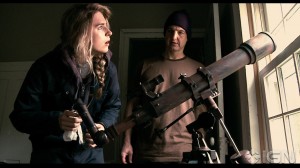Redemption in a Parallel Universe
Dir. Mike Cahill, with Brit Marling and William Mapother
There are science fiction movies, and there are tales of sin and redemption, but the genre and the story type just don’t seem to go together very much. Another Earth, the 2011 film by freshman director Mike Cahill, combines the two elegantly. The film, co-written by Cahill with a major writing contribution from Brit Marling, takes a relatively simple but intriguing science fiction concept and leverages it into a subtle and heart-wrenching exploration of some of the most devastating and difficult of human experiences.
Luminous Brit Marling plays Rhoda Williams (no relation to this writer), at the start of the film a 17-year-old high school astronomy geek with an MIT acceptance letter. Driving home on celebration night, a news report on her car radio announces the startling discovery of a new planet in the solar system, apparently very similar to earth, previously hidden behind the sun. Distracted, Rhoda leans out her window to look at the sky as she’s driving, and her path crosses another in the worst possible way. John Burroughs (William Mapother), in the other vehicle, loses his wife and family in the crash; Rhoda skips MIT and spends four years in prison.
After that terrible opening the film jumps forward, and follows Rhoda’s struggle after her release. The predictable challenges of reentry are dwarfed by her overwhelming feelings of guilt and depression. Even the costuming emphasizes her sadness and isolation; the previously confident young woman is only capable of leaving the house hidden deep inside a hooded sweatshirt, headphones further sealing her in. She takes a job as a janitor in her old high school, and even among the familiar faculty and staff, not a soul seems even to recognize her.
A bit of internet research into the identity and fate of her accident victim makes things worse, makes her emotional pain unbearable, and triggers a suicide attempt characterized at once by desperate passivity and violent self-loathing. Following the attempt, a melancholy Rhoda enters an essay contest, of all things, sponsored by an Australian billionaire, with the prize being a seat on a space mission to the newly discovered planet, which is drawing steadily closer to earth.
The strange new planet is now called Earth 2 (which one commentator notes is absurdly self-centered – “Do you think up there they call themselves Earth 2?”). The first staticky radio contact reveals it to be an apparent mirror image of our own, apparently complete with our own exact doubles. The doppelganger planet, a growing and beautiful presence in the film’s shots of both the day and the night sky, thus literalizes the concept of a parallel universe in an entirely original way.
As the astronomical story develops, Rhoda, foundering in the awareness that she has done something totally unforgivable, takes tentative steps toward making amends to the devastated and unsuspecting John Burroughs. Without following anything resembling a plan, she attempts this directly but anonymously, not revealing to him her identity or their connection. Both Rhoda and John face the same problem, actually, although from necessarily different places. John barely copes with his profound trauma and loss, and in its aftermath struggles to regain some semblance of a human existence. As his relationship with Rhoda develops, he eventually faces directly the enormous practical and spiritual challenge of finding a way to forgive the one, until late in the film unknown to him, who caused his trauma. Rhoda’s search for forgiveness only begins with the need and the attempt to make amends. In that process, she also learns that the calculus of forgiveness is not simple, that it cannot simply be sought from others, that the bigger challenge may be in finding a way to forgive herself.
As the planet draws nearer, the film offers a series of voice-over media interviews with leading thinkers, both scientific and spiritual, that show a culture trying to come to terms with the notion of an apparently real parallel universe. In addition to the sheer astronomical and scientific challenges it presents, the idea of a dual or parallel existence, made inescapably literal with the appearance of Earth 2, has major philosophical implications. Some of these voice-overs and interviews, at least, are from real life figures making cameo appearances. Dr. Richard Berendzen, for example, as himself, formulates the most relevant dimension of the development:
It would be very hard to think “I am over there” and “Can I go meet me?” and “Is that me better than this me?” “Can I learn from the other me?” “Has the other me made the same mistakes I’ve made?” Or, “Can I sit down and have a conversation with me?” Wouldn’t that be an interesting thing? The truth is, we do that all day long every day. People don’t admit it and they don’t think about it too much, but they do. Every day, they’re talking in their own head. “What’s he doing?” “Why’d he do that?” “What did she think?” “Did I say the right thing?” In this case, there’s another you out there.
To Rhoda and to John Burroughs both, the possibility that things might not be exactly the same in that other world is powerfully seductive, though for different reasons. Who among us, struggling with bad choices and unbearable guilt, loss and overwhelming pain, has not looked back at our own actions and longed for the impossible – the second chance, the ability to undo, to choose and act differently? In its development of the idea of another world, Another Earth gradually, carefully, believably, articulates that deep and familiar longing for escape, and the underlying fantasy of another world where things might somehow be different.
The “anonymous” part of Rhoda’s amends path, her delay in revealing her true identity to John Burroughs, is obviously a bad, very bad idea, a ticking narrative time-bomb that viewers wait for, white-knuckled, until it finally goes off like the dropping of a massive other shoe. With that climactic turn of events, the film brings together and resolves at least some of its problems. A single final shot, undoubtedly the most intriguing of the entire film, simultaneously answers many of the film’s questions and opens the door to a whole host of new ones. The astronomical nuts and bolts are a stretch, but that’s science fiction – when it’s done right. A film of undeniable originality and imagination, Another Earth transcends its genre altogether, and transforms a relatively simple concept into a rich and beautiful meditation on grief and loss, forgiveness and redemption.


